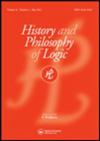逻辑与非洲哲学:关于非洲思想体系的开创性文章
IF 0.5
3区 哲学
Q3 HISTORY & PHILOSOPHY OF SCIENCE
引用次数: 3
摘要
除此之外,麦门自己的偏好也变得清晰起来:“尽管他那个时代的许多哲学家都提升了天才的地位,但麦门优先考虑的是有条不紊的发明家,他的性格在前一个世纪就受到了颂扬”(同上)。奇库雷尔的书对麦蒙哲学的这一重要方面及其对其他科学知识领域的适用性提供了清晰、全面的见解。同时,她通过提到迈蒙“对人类可完善性过程和知识进步的贡献”,暗示了迈蒙的发明理论对他的总体思维和哲学的重要性(第155页)。此外,奇库雷尔还指出,麦蒙的理论远远超出了科学和逻辑的问题,因为对他来说,“发明不仅是哲学中的一个流行话题,也是生活的指导原则”(第5页)。在这一点上,我想建议,哲学和生活之间的区别可能在这种情况下并不完全有效,因为人类在知识和其他方面的可完善性的永无止境的、不完成的过程的思想,可以理解为迈蒙自己的生活哲学的核心,或者他的生存哲学是追求无法实现的完美,这可能被视为他的“夜系统”的潜在中心主题(迈蒙1790/2004,236)。本文章由计算机程序翻译,如有差异,请以英文原文为准。
Logic and African philosophy: seminal essays on African systems of thought
Besides this, Maimon’s own preference becomes clear: ‘Even though many philosophers of his time elevated the status of the genius, Maimon prioritized the methodical inventor, whose character had been celebrated in the prior century’ (ibid.). Chikurel’s book provides a clear, comprehensive insight into this important aspect of Maimon’s philosophy and its applicability to other fields of scientific knowledge. At the same time, she hints at the significance of Maimon’s theory of invention for his thinking in general and for philosophy as such by mentioning his ‘contribution to the process of human perfectibility and the advancement of knowledge’ (p. 155). Furthermore, Chikurel also states that Maimon’s theory goes well beyond questions of science and logic, since for him ‘invention is not only a popular topic in philosophy, but also a guiding principle of life’ (p. 5). At this point I would like to suggest that the distinction between philosophy and life may not fully work in this context, since the thought of the never-ending, incompletable process of human perfectibility – in knowledge and beyond, individually and generally – can be understood as the very core of Maimon’s own philosophy of life, or his philosophy of existence as striving for unachievable perfection, which may be seen as the underlying central motif of his ‘Nichtsystem’ (Maimon 1790/2004, 236).
求助全文
通过发布文献求助,成功后即可免费获取论文全文。
去求助
来源期刊

History and Philosophy of Logic
综合性期刊-科学史与科学哲学
CiteScore
0.80
自引率
0.00%
发文量
24
审稿时长
>12 weeks
期刊介绍:
History and Philosophy of Logic contains articles, notes and book reviews dealing with the history and philosophy of logic. ’Logic’ is understood to be any volume of knowledge which was regarded as logic at the time in question. ’History’ refers back to ancient times and also to work in this century; however, the Editor will not accept articles, including review articles, on very recent work on a topic. ’Philosophy’ refers to broad and general questions: specialist articles which are now classed as ’philosophical logic’ will not be published.
The Editor will consider articles on the relationship between logic and other branches of knowledge, but the component of logic must be substantial. Topics with no temporal specification are to be interpreted both historically and philosophically. Each topic includes its own metalogic where appropriate.
 求助内容:
求助内容: 应助结果提醒方式:
应助结果提醒方式:


